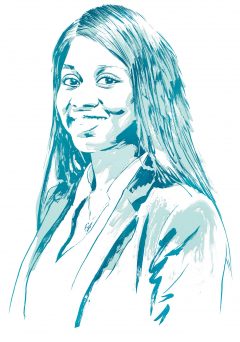This case study features in the Schmidt Science Fellows Annual Report 2018-2019.

Dr. Mercy Asiedu grew up in Ghana before completing her PhD at Duke University, North Carolina. Her research curiosities are driven by understanding how health inequalities exist, and how she can use her expertise in biomedical engineering to address them through advances and innovations in technology. She is currently pursuing her Schmidt Science Fellows placement at MIT.
Mercy spoke to us about her motivations and her experience as a 2019 Fellow.
What made you want to apply to Schmidt Science Fellows?
What attracted me most to the program was being able to spend a year doing research and learning in a field different from my own. During my PhD, I really wanted to learn more about artificial intelligence (AI) and machine learning to make my findings more applicable. I wanted to learn more about how novel deep learning techniques could be applied to medical images, such as ultrasound, MRI or pathology slides.
However, my background was not in computer science, so it would have been difficult to find a competitive lab to explore this area. Being funded and backed by Schmidt Science Fellows enabled me to get into a computer science lab at MIT doing just this.
How did your PhD lead to your Fellowship?
My PhD was in biomedical engineering and global health where I developed a device for low-cost cervical cancer screening: it’s like a miniature high-magnification camera that can be used by a woman for selftesting. We tested this device, called a Calloscope, at Duke Medical Centre and in hospitals in Ghana, receiving positive feedback.
My PhD used computer algorithms to classify the pictures for diagnosis. But I was working on basic and traditional types of machine learning where you lose quite a lot of clinically useful data, so I wanted to learn more about how AI approaches could best analyse the image data and improve diagnosis.
I wouldn’t be able to do the same interdisciplinary collaborations without Schmidt Science Fellows’ support.
What can you do now that you couldn’t without your Fellowship?
I wouldn’t be able to do the same interdisciplinary collaborations without Schmidt Science Fellows’ support. For instance, at Massachusetts General Hospital, they have a huge database of mammogram images, and we’re combining pathology and historical medical records to predict the people most at risk. Then, at the Dana Faber Institute, a new project is using slides of patient pathology and investigating the family history of disease to predict risk factors.
I’m learning so many new skills such as machine learning how to code in Titan, using Linux systems, and working with Big Data that I wouldn’t have had the chance to do otherwise. I’m also learning how to communicate science so it can be understood by people from different disciplines.
How have you found the Global Meetings?
The Global Meetings have allowed us to hear from successful scientists who have taken non-traditional paths in their academic careers, such as switching disciplines, and have been successful, not in spite of their paths, but because of their paths. My main takeaway was that having multiple lenses to view scientific research allows one to make connections that might not necessarily be obvious to others who have remained in the same area of academic research.
The meetings are also a fantastic opportunity for building relationships with my cohort and with previous Fellows.
How do you see your future developing?
I want to be an entrepreneur and to form a medical device company to focus on developing countries, particularly in sub-Saharan Africa. I want to use machine learning to help us bridge the global health gap and really bring Africans to the conversation.